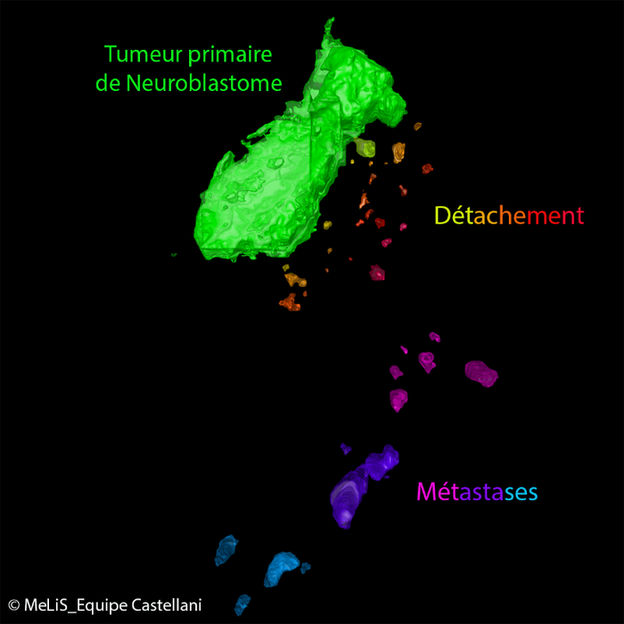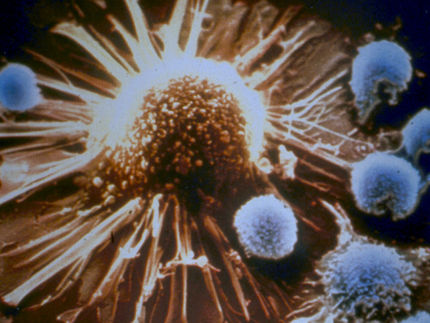Shut-off switch for lymphoma
Important tumor suppressor discovered in immune cells
A safety switch that automatically stops the device for example before it overheats are built into many electrical appliances. The body's cells are also equipped with this kind of "emergency stop" functions. They make sure that a defective cell doesn't grow uncontrollably, becoming a tumor cell. A team from the Technical University of Munich (TUM) has now discovered such a switch in immune cells, the T cells. In the future it will be possible to use these results in new therapies for the treatment of T cell Non-Hodgkin's lymphoma triggered by defective immune cells.
In the body T cells are usually responsible for immediately detecting and killing cancer cells. However, problems can arise when a T cell itself develops a defect in its genome, the DNA. If the defect affects areas of the genome which are responsible for cell growth, referred to as oncogenes, the T cell itself can become an uncontrollably growing tumor cell. In addition, the T cell, an important part of the body's immune system against cancer, fails.
This is exactly what occurs in T cell Non-Hodgkin's lymphoma. This aggressive form of lymphoma has a very low rate of successful treatment and afflicts approximately one out of every 100,000 persons in Germany. Prof. Jürgen Ruland, Director of the TUM Institute for Clinical Chemistry and Pathobiochemistry and Principal Investigator at the TUM Central Institute for Translational Cancer Research (TranslaTUM) and at the German Cancer Consortium (DKTK), is working together with his team to precisely understand the molecular mechanisms of these cancers in order to be able to treat them more effectively.
PD-1 as the shut-off switch in tumor formation
In their new study, currently published in the journal "Nature", the scientists succeeded in a very important step: They were able to show that the defective T cells also have an emergency shut-off switch, referred to as a tumor suppressor. They ascertained that the protein PD-1 can turn off defective T cells at an early stage and thus prevent them from becoming tumor cells. The researchers first discovered this function of PD-1 in a mouse model for T cell Non-Hodgkin's lymphoma and were also able to explain the mechanism: PD-1 is activated by defects in genes for cell growth, known as oncogenes, and then suppresses the effect of these genes using additional proteins. Thus it functions as a shut-off switch to prevent the uncontrolled growth of defective T cells.
Tumor analysis helps in deciding on therapies
Then the scientists also successfully resolved the question of why many T cell Non-Hodgkin's lymphomas are so aggressive, in spite of this protective function. They investigated genetic data sets from 150 patients: "Based on our previous results, we intentionally focused closely on PD-1. In individual groups more than 30 % of the patients exhibited changes in the regions of the genome which interfered with the production of PD-1. This has disastrous consequences in the tumor – PD-1 no longer functions as an 'emergency shut-off' for them. The diseased T cells can reproduce uncontrollably," explains Tim Wartewig, lead author of the study.
"These patients could be helped by medications that reverse the loss of PD-1 signaling and thereby destroy the tumor cells. This type of medication already exists for other forms of cancer – In our opinion, use with T cell Non-Hodgkin's lymphoma should also be considered," says Jürgen Ruland. The scientists therefore recommend investigating individual differences in tumors before making decisions about which medication is to be administered.
Original publication
Most read news
Original publication
Tim Wartewig, Zsuzsanna Kurgyis, Selina Keppler, Konstanze Pechloff, Erik Hameister, Rupert Öllinger, Roman Maresch, Thorsten Buch, Katja Steiger, Christof Winter, Roland Rad & Jürgen Ruland; "PD-1 is a haploinsufficient suppressor of T cell lymphomagenesis"; Nature; 2017
Topics
Organizations
Other news from the department science

Get the life science industry in your inbox
By submitting this form you agree that LUMITOS AG will send you the newsletter(s) selected above by email. Your data will not be passed on to third parties. Your data will be stored and processed in accordance with our data protection regulations. LUMITOS may contact you by email for the purpose of advertising or market and opinion surveys. You can revoke your consent at any time without giving reasons to LUMITOS AG, Ernst-Augustin-Str. 2, 12489 Berlin, Germany or by e-mail at revoke@lumitos.com with effect for the future. In addition, each email contains a link to unsubscribe from the corresponding newsletter.
Most read news
More news from our other portals
Last viewed contents
Researchers home in on way to predict aggressiveness of oral cancer

Healthy cells can impact tumour progression during embryonic development - Avian embryo model of neuroblastoma
Category:Biofield_therapies

Enduring cold temperatures alters fat cell epigenetics
Biotech needs the right policies to stay on track in new EU Member States
Katholieke Universiteit Leuven enters into license agreement with Pfizer for the development of new anti-HIV drugs
Maud_Menten
Bristol-Myers Squibb Discontinues Development of BMS-986094 for the Treatment of Hepatitis C






















































